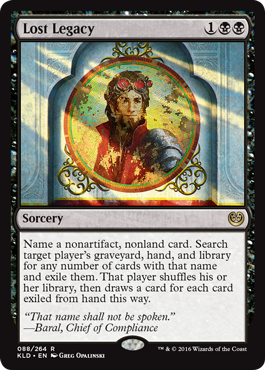Revealing a Legacy
I remember when I was fourteen years old. Champions of Kamigawa came out, and with it came this little card:
As soon as Cranial Extraction hit the internet, the buzz began. People started to talk about all the decks it would see play in. All the strategies it would negate. All the strong ways you could use the card, both offensively and defensively. It was one of the most sought-after cards in the set.
I spent the better part of the next year playing decks that could cast Cranial Extraction in some way. Whether I was heavy black control or green splashing a single Swamp for it, my Cranial Extractions seldom left my side.
I have a lot of experience casting Cranial Extractions.
In the time since, we've seen many variants. Extirpate. Memoricide. Infinite Obliteration. And even before Cranial Extraction, there were cards like Eradicate, Lobotomy, and Jester's Cap. Each has its own upsides and downsides. But the core idea is the same: strip your opponent of a specific card.
I've evolved a lot as a player since those days, and learned a lot. In retrospect, was I right to play with Cranial Extraction all those times? No! Was I wrong to play with them all those times? Also no! It's an extremely powerful card when played correctly—and quite the opposite when played poorly.
Kaladesh introduces the next card in this lineage. And it's a very potent weapon...if you wield it wisely.
Let me introduce you to the newest piece of this legacy:

Hmmm, what's going on in that art and flavor text? Is that a Kiran Nalaar reference I see? I'll leave that one to the magnificent story team...

Let's talk about this card.
Lost Legacy costs one mana less than this type of effect typically runs, which can be a big deal if you're trying to get the drop on your opponent's early gameplay. You can't hit artifacts—and while there are plenty in Kaladesh, that's probably not the primary thing you're looking to name with this.
The real tradeoff is that if you hit a card out of their hand then they get a card back—and that's generally okay. Why? Because if you executed on this card right, your opponent's strategy should be so crippled that an extra card won't matter.
What exactly do I mean? Well, let's dive into evaluating this kind of effect.
A Lost Cause
This kind of effect can look very tempting.
For three mana, you get rid of whichever card of your opponent's you hate the most. Gideon, Ally of Zendikar got you down? Get them all outta here!
However, it comes at a cost: card disadvantage.
Let's say your opponent doesn't have any of the named card in their hand or in their graveyard. Well, you just spent mana and a card to do nothing that affected the game state at all. You didn't deal with anything on the board. Sure, you know the contents of your opponent's library, and your opponent's draws will be slightly worse for the rest of the game...but there's no guarantee that even matters. Your opponent could just as easily draw another good thing in place of that Gideon.
This impact on the game is not worth a card. You only get to play so many cards in your deck, and the result of casting this card against most decks is not going to be worth the card slot. There are many cards in roughly the same power band as Gideon that they could draw instead.
Furthermore, Lost Legacy often gives them a card in return; even if they have the card in their hand, they still pick up a new card to replace it. You aren't going to break even on a Lost Legacy.
And yet, earlier I said this kind of effect can be extremely powerful—indeed, I expect Lost Legacy to see Standard play.
Why is that? Read on!
Legacy of Victory
Casting cards like Lost Legacy "for value," stripping one specific threat of many out of your opponent's deck, is not the best way to use this card. To make up for the fact that you're not contributing to the board, you need to do more than just make their draws worse—you need to undermine their entire strategy.
Fortunately, there are some decks in Standard where Lost Legacy is able to do just that.
The time where effects like this shine is when your opponent's deck strongly relies on a specific card, and exiling all the copies of it removes their primary way to victory. Not just one of many of their ways to victory, but the one their deck tends to use time and time again.
The classic example is against a combo deck. Imagine you're playing against someone trying to combo kill you by cascading into Living End in Modern.
Their entire game plan is cycling cards like Deadshot Minotaur and Monstrous Carabid so they can cast Living End to return a well-stocked graveyard.
If you Lost Legacy them for Living End, their deck suddenly fails to work. It's pretty unlikely a team of Monstrous Carabids is going to take you down in Modern.

In this kind of case, any cards you give them back with Lost Legacy are irrelevant. The fact you didn't get any board or card advantage with your play is irrelevant. You just entirely ruined their game plan, and now there's very little they can do against you. You've picked up the most important kind of advantage: game advantage!
It's in cases like this where Lost Legacy is absolutely back-breaking.
That's one example from Modern—but it's applicable everywhere. For example, there are a lot of Standard decks built around casting and taking advantage of a very specific card right now. I'm sure you recognize this crazy card:
While it's not quite the same as removing all of the combo pieces from a deck, for some decks getting rid of all of the Emrakuls can destroy their primary strategy and may very well be worth it. Out of a deck like Ken Yukuhiro's Red-Green Delirium from Pro Tour Eldritch Moon, you can probably contain a lot of his other threats if the threat of Emrakul is off the table—not to mention you can always draw multiple Lost Legacys and really shut down all of the threats available. And keep in mind that Lost Legacy exiles from graveyards, so it's also a way to fight cards like World Breaker that repeatedly operate out of a graveyard!
This pinpoint nature is why these kinds of cards typically tend to be incredible sideboard cards, coming in against the decks they're best against while not being in your hand against decks that don't have a strategy heavily focused on a specific card. And Lost Legacy fits that bill entirely: I could see it appearing in many black-aligned sideboards. In Modern it can be efficient against combo at three mana, and in Standard it's a fine option if any deck gets too hyper-focused on deploying one card.
Found Legacy
How do you protect yourself against cards like Lost Legacy? Well, the best way is threat diversity. Splitting your relevant threats (at least after sideboarding) by doing things like playing two and two copies rather than four of one card is one way.
Are those the kind of countermeasures you'll need to take? Well, it depends a lot on how Standard ends up! Stay tuned to Kaladesh previews, start building decks, and we'll see what happens. I definitely wouldn't be surprised to see Lost Legacy become a sideboard card you really have to keep in mind when deck building.
That wraps up my preview of Lost Legacy—and hopefully you have a better idea of how to properly use it. Cast it wisely!
If you have any thoughts or comments, feel free to reach me by sending a tweet or a Tumblr message. You can also always reach me via email at BeyondBasicsMagic@gmail.com.
I'll be back next week with another Kaladesh preview card. Talk with you again then!

